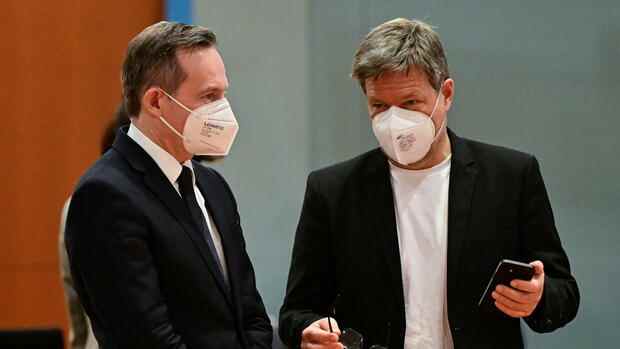The large package of measures apparently failed, mainly due to a dispute between the Ministry of Economic Affairs and the Ministry of Transport.
(Photo: Reuters)
Berlin The federal government has failed with its plan for an overarching emergency climate program for the time being and is initially presenting a strategy for individual areas. For example, today (Wednesday) the ministries for climate, works and transport will only announce instruments for the buildings and transport sectors to get back on track for the targets of these areas.
The Climate Protection Act obliges them to do this, as the respective specifications for CO2 emissions for 2021 were not met here. The government actually wanted to present a comprehensive program across all sectors and ministries this Wednesday in the cabinet, with which Germany wanted to reduce its CO2 emissions by 65 percent by 2030 compared to 1990. This failed mainly due to the dispute between Climate Minister Robert Habeck (Greens) and Transport Minister Volker Wissing (FDP). It’s supposed to come in September.
With an overarching immediate climate protection program, the individual plans could actually have been made superfluous, since they would have been integrated into the overall plan. The individual programs are now suffering from the fact that they are neither reliably financed nor are individual proposals in the transport sector agreed, since other ministries would also have to be involved.
The Climate Protection Act prescribes upper limits for the CO2 emissions of CO2 for each sector and each year. The buildings sector missed it for the second time in a row, the transport sector for the first time. An independent panel of experts will examine the proposals to see whether they will achieve the 2023 targets again. This is also considered doubtful in the government.
Top jobs of the day
Find the best jobs now and
be notified by email.
Hardly any CO2 reductions in the transport sector since 1990
In the building sector, according to government circles, the focus should now be on refurbishment. More houses should use less energy and be heated with heat pumps or renewable energy instead of oil or gas. To this end, the Building Energy Act will be tightened so that all newly installed heating systems from 2024 will have a 65 percent share of renewable energy. By 2030, there should be six million heat pumps that are mainly operated with green electricity. The construction promotion of efficient houses should accompany the law.
The transport sector is particularly problematic, as it has barely reduced emissions since the 1990s. According to government circles, it is to be expected that Wissing will include a nationwide uniform local transport ticket in the program – albeit without a price tag. His master plan for setting up e-charging stations should also appear in it. Accordingly, there will be no disputes such as the further promotion of e-mobility, vehicle and company car taxation or the future amount of the truck toll, which should also be based on CO2 emissions.
All of this should actually appear in the comprehensive immediate climate protection program, on which no agreement can be reached before the summer break. Drafts of the mammoth project, for which practically all ministries have to deliver, have over 100 pages. It includes topics from a more climate-friendly agriculture with less meat production, the restructuring of industry to projects that have already been decided, such as the expansion of renewable energies. However, many are not only controversial, the financing is also open.
More: After the holidays, the nine-euro ticket for local transport ends. Now the federal government is apparently already working on a successor – even if Transport Minister Wissing does not want to know anything about it.
